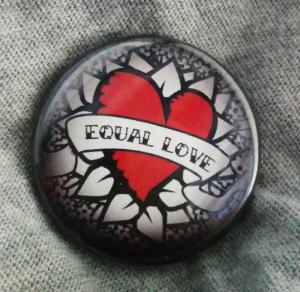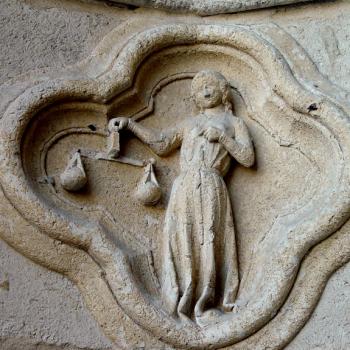
We are told to love our neighbor as ourselves, which means, every neighbor is to be loved and treated the same way as we love and treat ourselves. How can this be if we think we can love others unequally, saying some people deserve more love than others? We are to love everyone equally, but this does not mean everyone will be loved in the exact same way. Equality allows for differences, but of course, we must make certain that we do not allow such differences to be used to justify unjust treatment of others, saying everyone is “separate but equal” while actually undermining that equality (as happened with the way many have historically treated women or people of other races than their own). Equality allows for differences because each person is unique, and our love for them must include and take into consideration that uniqueness, that is, their own special needs. If we are expected to love others equally, we can be assured that God also loves others equally, for our engagement of love should reflect divine love, as we are made in the image and likeness of God.
God loves everyone equally, but how everyone will deal with and relate to that love will differ: some will be able to receive that love better than others due to the way they open or close themselves to it. This is why St. Gregory of Nyssa says God illumines everyone equally, that is, shares with everyone the same illumining grace:
But we have no doubt that then there will be one race including all, when all of us will become one body of Christ, formed by the one shape, since the divine image will illuminate us all equally; and we shall make it clear that what will be given to us in that change of our nature, in place of these present characteristics, will be better than any idea we can form by guesswork.[1]
Jesus said that he has become our friend, implying, he has become, in some fashion at least, our equal: “Also, because friendship exists between equals, as long as you consider God to have made Himself equal to man in some way, you should not deny the friendship God has with you, nor should you forsake your friendship with God. So let men cease, I repeat, let them cease despairing of their divinity at once!” [2] This equality, to be sure, is not in accordance to his divine nature, for his divine nature remains equal to God the Father and the Holy Spirit, but it is in accordance to his human nature. Through the incarnation, he became consubstantial with us, and in doing so, became our equal, showing that all humanity, all human persons, are meant to be and are equals to him by nature. Once we truly appreciate this, we will be able to see how and why every other human person is our equal. And, because the incarnation reveals to us the ways of God, we can find in and through it, that God does love us equally, for by becoming our equal in accordance to our nature shows God is willing to love each of us with the one and same love which allows us to become friends with God. This is something which is so radical it is difficult for us to fully comprehend; we can apprehend elements of it, as we can apprehend Jesus as a human, indeed, as a man, but we find it confusing when we consider he how can both be a human like us, equal to us, while at the same time being God and infinitely transcendent to us. It would seem that this must create some sort of division or schism in the person of Christ, but that is not the case, for Christ is one. Once we appreciate this, once we truly appreciate what it means for him to be consubstantial with us, and so to be our equal and capable of truly becoming our friend, we should stop thinking of God as looking to divide us and use our differences to treat us with different levels of love. Sin, not God, causes division, and through that division, the equality of each person in Christ is undermined by the false individual which is constructed by sin, where different false selves will integrate and employ their levels of their natural goodness. Christ has come to fix that; by taking on our human nature, Christ creates the foundation by which all humanity can be brought together, to be made one, and in the process of that unity, find their natural equality restored in the eschaton: “For everyone will stand on equal footing before the tribunal of Christ [cf. Rom 14:10], and there will be ‘no acceptance of persons with God’ [Col 3:25].” [3]
We are to embrace God’s love, so that, by opening ourselves to it, we will cooperate with it, sharing it with the rest of the world. We are meant to become Christ’s agents in the world. We are, moreover, to be patient, realizing that it will take until the eschaton for all the effects of grace, all the healing which it is to do, to take effect; yet, if we embrace God’s love, and so live in and with it, we will be able to do this, because it is the nature of love to be patient and endure much for the beloved:
Love is patient and kind; love is not jealous or boastful; it is not arrogant or rude. Love does not insist on its own way; it is not irritable or resentful; it does not rejoice at wrong, but rejoices in the right. Love bears all things, believes all things, hopes all things, endures all things (1 Cor. 13:4-7 RSV).
Christian love embraces hope. As we are to hope for our own salvation, we are also to hope for the salvation of all because we are to love our neighbors as our ourselves. Anything else is evidence of the power that sin continues to have us on, tainting us and our relationships with others. We, moreover, should believe that it is possible that what we hope for will be accomplished because, as Paul said, love “believes all things, hopes all things.” Love believes in and hopes for all that is good, and the salvation of all is indeed a good, indeed, the good which God desires. With such hope, with such faith, with such love, we will be able to love all, including those who we find difficult to love, those whom society shuns, because we will see them, not just as they are in their corrupted form, but in their eschatological form, the person they have always been meant to be, that is, as a person who is our equal in Christ.
[1] St. Gregory of Nyssa, “A Discourse on the Dead” in On Death and Eternal Life. Trans. Brian E. Daley (Yonkers, NY: St. Vladimir’s Seminary Press, 2022), 31.
[2] Marsilio Ficino, On the Christian Religion. Trans. Dan Attrell, Brett Bartlett, and David Porreca (Toronto: University of Toronto Press, 2022), 97.
[3] St. Jerome, Commentary on Isaiah in St Jerome: Commentary on Isaiah; Origen Homilies 1-9 on Isaiah. Trans. Thomas P. Scheck (New York: Paulist Press, 2015), 387.
Stay in touch! Like A Little Bit of Nothing on Facebook.
If you liked what you read, please consider sharing it with your friends and family!
N.B.: While I read comments to moderate them, I rarely respond to them. If I don’t respond to your comment directly, don’t assume I am unthankful for it. I appreciate it. But I want readers to feel free to ask questions, and hopefully, dialogue with each other. I have shared what I wanted to say, though some responses will get a brief reply by me, or, if I find it interesting and something I can engage fully, as the foundation for another post. I have had many posts inspired or improved upon thanks to my readers.













